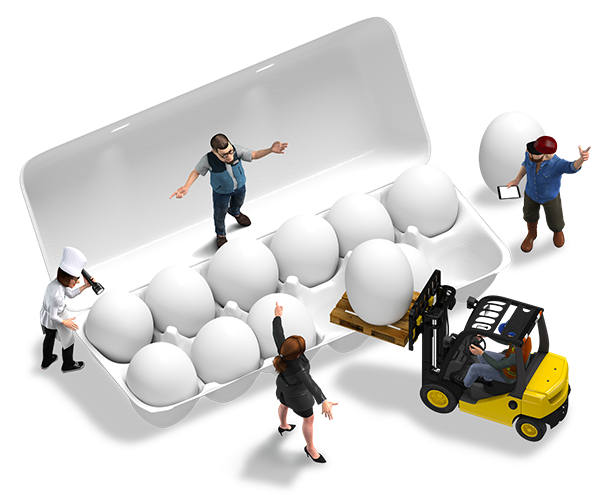
The Model
Supply management is the system by which milk, table and hatching egg, chicken and turkey producers strike the best possible balance between supply and demand by Quebec and Canadian consumers for their products.
Canadian producers in the supply management system rely entirely on the market price and receive no direct government subsidies to support their incomes.

“Our job is easier at the bank when we work with supply-managed productions. We have excellent entrepreneurs in those sectors.”Claude Bilodeau, Expert Advisor, Agribusiness and Agrifood Sector at the National Bank

Three pillars support supply management
- Managing production based on the market
- Ensuring that producers receive a steady income
- Managing imports

Proximity
“Retailers want producers to keep growing in our regions and to keep making our communities places where all enterprises flourish, which is why we support supply management.”Pierre-Alexandre Blouin, interim Chief Executive Officer, Association des détaillants en alimentation du Québec
Quebecers want to consume local foods not only because it is healthy and ecological to do so, but because it also helps keep agriculture alive in their regions and provides jobs across Quebec.
Due to its very nature, supply management fulfills these desires, promotes the consumption of dairy and poultry products that are made in the country by our producers and processors, and creates jobs and significant economic benefits for our regions.
Quebecers and Canadians also recognize this, as shown by a Campaign Research survey in May 2017. In fact, over half of Quebecers approve of the “protectionism” of Canada’s dairy and poultry industries, to the extent that they would pay more for eggs, chicken, milk and cheese than for similar products from the U.S.
It must be mentioned that retail price differences between Canada and the United States are not rare when it comes to foods and many common consumer goods. These differences have nothing to do with supply management. They are instead related to several other factors, such as the size and structure of the markets and distribution networks.
Quality
“Supply management ensures that food is produced in Canada according to standards that are upheld.”Dr René Bergeron, President, Association des médecins vétérinaires du Québec
The quality of the marketed products is a constant concern for milk, egg and poultry producers. Supply management and collective marketing help set some of the highest and strictest mandatory and common quality standards in the world.
Example
All milk, egg and poultry production enterprises are subject to specific quality programs for the environment, food safety, animal care, traceability and compliance.
Innovation
“Supply management is important because it has helped Canada become a leader and a reference in bovine genetics, especially as concerns dairy cattle. [...] For those who don’t believe that supply management promotes innovation, we can show them that they’re mistaken.”Mario Hébert, General Manager of the Centre d’insémination artificielle du Québec
“There has been so much development in cheeses thanks to supply management. The chicken supply has totally changed over the years. We have so many new cuts. [...] Today, turkey is a product that has been developed, is available and can be bought in large quantity.”Pierre Carrier, founder of Agnus Dei, caterer
Supply management provides financial stability and a continuous supply, which allows producers and processors to focus on innovation in their area of expertise.
Examples
Genetic material from our dairy cattle is exported to around one hundred countries, and the quantity of exported semen and breeding cow embryos has doubled in 30 years. Sales went from $68 million in 1988 to $140 million in 2015.
Since 2013, Quebec is the only territory in America where traceability information on eggs intended for retail sale must be recorded. Furthermore, thanks to GPS mapping of poultry enterprises, Canada has a cutting-edge chicken farming traceability system.
Moreover, the assortment of over 500 fine cheeses made in Quebec, a proud example of its locally produced foods, demonstrates these artisans’ expertise and the industry’s clever innovativeness.
Performance
“Supply management is not an obstacle to performance or innovation. It is in the producers’ interest to improve their production costs so that they can improve their financial situation.”René Roy, agr., agro-economist, Research and Development, Valacta
To reduce their environmental footprint, get the most out of their equipment and increase their productivity, producers in the supply management system base their strategic plan on performance and productivity.
Example
Several indicators, such as the annual production per farm, the number of cows per farm, the quantity of milk produced per cow and the total number of hours worked per hectolitre, show the continuous improvement of Quebec dairy farms’ technical performances:
Dairy Performance
Source: Groupe Agéco, Survey of production costs of Quebec diary enterprises.
Sustainability
“Managing production on the basis of supply is an agro-ecological action. It keeps surpluses from being produced in the market which lead to a slump in prices. Managing production in step with demand is ecological, profitable and responsible.”Marcel Groleau, President of the UPA and spokesperson of The Supply Management Movement
“When you refer to the available studies on the dairy industry, which were produced abroad, you notice that the Canadian dairy industry’s environmental performance holds up well when it comes to the carbon footprint, the water balance and agri-environmental practices.”Jean-Michel Couture, researcher, Groupe Agéco
Quebec dairy production
In fact, according to the Canadian milk life cycle assessment published in November 2012, compared to other milk producing regions in the world, Quebec is one of the lowest greenhouse gas emitters and water consumers per kilo of milk produced, as shown by the figures below.
Source: Groupe Agéco, Survey of production costs of Quebec diary enterprises.
Table egg production in Canada between 1962 and 2012
uses fewer resources
produces fewer emissions
Source: Global Ecologic.
Comparison of dairy product retail prices and producer milk prices in the united states, 1990-2016
Canada
Sources: Statistics Canada and Canadian Dairy Commission.
United States
Sources: Bureau of Labor Statistics (BLS) and United States Department of Agriculture (USDA).


















